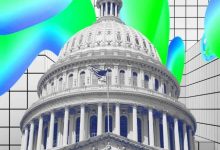South Korean Regulator and SEC to Discuss Bitcoin ETFs!

- South Korean regulators and US financial authorities are gearing up to discuss non-fungible tokens (NFTs) and Bitcoin ETFs.
- The upcoming discussions between South Korean and US financial authorities regarding the inclusion of Bitcoin ETFs and NFTs in the virtual finance space mark a critical moment in the realm of digital finance.
- NFTs, known for being unique digital ownership certificates, have emerged as a transformative force in various sectors, including art, gaming, and entertainment.
South Korean regulators will meet with US regulators about Bitcoin ETFs and NFTs: Here are the details!
South Korean Regulators to Discuss Bitcoin ETFs and NFTs with the SEC

In the dynamic intersection of global financial interests, South Korean regulators and the US Securities and Exchange Commission (SEC) are preparing to engage in discussions about non-fungible tokens (NFTs) and Bitcoin ETFs. Specifically, the South Korean Financial Supervisory Service (FSS) and the US SEC are set to hold crucial talks concerning the incorporation of Bitcoin ETFs and non-fungible tokens (NFTs) into the virtual asset space.
This high-stakes meeting between regulatory authorities highlights the evolving landscape of digital finance and the challenges of regulation. The decision of South Korean and US financial authorities to come together and negotiate the inclusion of Bitcoin ETFs and NFTs in the virtual finance space signals a critical moment in the field of virtual finance, given the increasing interest in cryptocurrencies and digital assets.
Reportedly, this development has been reported by local media outlet Edaily, sparking discussions within the virtual asset sector. Meanwhile, the President of the Financial Supervisory Service (FSS), Lee Bok-hyun, is expected to initiate discussions with SEC Chairman Gary Gensler in May, focusing on the potential inclusion of Bitcoin Spot ETFs and NFTs in the virtual asset space. This significant initiative underscores the need for consistent regulatory frameworks to address the complexity of emerging digital markets.
NFTs, known for being unique digital ownership certificates, have emerged as a transformative force in various sectors, including art, gaming, and entertainment. However, despite their growing significance, there is uncertainty about how South Korea will legally classify NFTs, raising questions about whether they should be considered technology, virtual assets, or securities.
What’s in Store for the Future?
According to industry sources, the cautious approach of excluding NFTs from the upcoming Executive Decree of the South Korean Virtual Asset Act reflects a response driven by low market risks. However, the rising prices and speculative excitement surrounding NFTs have led to calls for their formal recognition as tradable assets.
Critics argue that the lack of a clear legal framework for NFTs could have profound consequences for businesses operating in this area. In particular, stringent regulatory requirements such as virtual asset business licenses and compliance certificates could stifle innovation, especially for startups and SMEs, hindering market access.
However, within the framework of these discussions, concerns have been raised about the potential impact of increased regulatory oversight on individual rights and privacy. As regulatory scrutiny intensifies, there are worries that enhanced oversight could facilitate comprehensive monitoring and auditing of NFT transactions.
Regarding Bitcoin ETFs, South Korea’s FSC issued a warning in January about potential violations related to brokering overseas-listed Spot Bitcoin ETFs. Notably, major securities firms such as Mirae Asset Securities and Samsung Securities suspended brokering services for Canadian and German Spot Bitcoin ETFs as a preventive measure.
Stakeholders eagerly await the outcomes of discussions between the FSS and SEC, anticipating potential changes in the Implementation Regulation of the Virtual Asset Act and their broader implications for the overall digital economy. As the global regulatory landscape evolves, it can be said that the results of these discussions are poised to shape the future trajectory of virtual finance.



 Bitcoin
Bitcoin  Ethereum
Ethereum  Tether
Tether  Dogecoin
Dogecoin  USDC
USDC  Cardano
Cardano  TRON
TRON  Chainlink
Chainlink  Stellar
Stellar  Hedera
Hedera  Bitcoin Cash
Bitcoin Cash  LEO Token
LEO Token  Litecoin
Litecoin  Cronos
Cronos  Ethereum Classic
Ethereum Classic  Monero
Monero  Dai
Dai  Algorand
Algorand  OKB
OKB  Cosmos Hub
Cosmos Hub  Stacks
Stacks  Theta Network
Theta Network  Gate
Gate  Maker
Maker  KuCoin
KuCoin  Tezos
Tezos  IOTA
IOTA  NEO
NEO  Polygon
Polygon  Zcash
Zcash  Synthetix Network
Synthetix Network  Tether Gold
Tether Gold  TrueUSD
TrueUSD  Dash
Dash  Holo
Holo  Zilliqa
Zilliqa  Enjin Coin
Enjin Coin  0x Protocol
0x Protocol  Qtum
Qtum  Siacoin
Siacoin  Basic Attention
Basic Attention  Ravencoin
Ravencoin  Bitcoin Gold
Bitcoin Gold  Decred
Decred  NEM
NEM  Ontology
Ontology  DigiByte
DigiByte  Nano
Nano  Status
Status  Huobi
Huobi  Hive
Hive  Lisk
Lisk  Waves
Waves  Numeraire
Numeraire  Steem
Steem  Pax Dollar
Pax Dollar  BUSD
BUSD  OMG Network
OMG Network  Ren
Ren  Bitcoin Diamond
Bitcoin Diamond  Bytom
Bytom